Mon, July 05, 2010 | Intelligence and Terrorism Information Center
Iran announces conditions for resuming talks with the West
During a press conference held this week by the president of Iran, Mahmoud Ahmadinejad specified Iran’s conditions for resuming the nuclear talks with the West. Ahmadinejad said that Iran decided to put on hold its diplomatic contacts with the 5+1 group to punish the West for the sanctions recently imposed on Iran, and that it would only agree to resume the talks at the end of the month of Ramadan, in late August. The president of Iran stated that Western powers must clarify their stance on the nuclear weapons held by Israel and announce whether they are committed to the Non-Proliferation Treaty (NPT) and the amendments introduced to it at the recent NPT conference in New York. Another condition for resuming talks is that Western countries clarify their intentions with regard to negotiations with Iran and say whether they want friendship or enmity with Iran. Ahmadinejad also said that more countries should be involved in the negotiations with Iran, rather than just the five permanent Security Council members and Germany (various news agencies, June 28).
In its latest issue, Revolutionary Guards mouthpiece Sobh-e Sadegh also listed several conditions Iran must demand prior to going back to the negotiating table. A commentary article published by the weekly says that in light of the sanctions recently imposed on Iran, it must set conditions for continuing talks.
According to the weekly, the strategy adopted by the West towards Iran includes simultaneous use of “hard power” (sanctions) and “soft power” (negotiations) to force Iran into unconditional acceptance of its demands. The West seeks to take advantage of the talks to convince the Iranian regime to change its policy by playing upon concerns about the impact of the sanctions on its economic and political stability, create domestic differences of opinion in Iran over the required strategy with regard to the nuclear program, break the spirit of Iran’s internal resistance, sway domestic and foreign public opinion against Iran, and falsely present the lack of solution to the nuclear crisis as the result of Iran’s refusal to agree to the demands brought up in the negotiations. Thus, the West attempts to lay the groundwork for further resolutions against it. Accordingly, Iran must adopt a new formula for holding talks, based on the fact that it does not trust the West and that it is the West that must engage in trust-building steps towards Iran.
Iran must set conditions for resuming the talks, including: lifting all sanctions against it, transferring Iran’s nuclear dossier from the Security Council back to the IAEA, reimbursing it for the damage caused by the unfounded allegations against it, clearly recognizing its right to a peaceful nuclear energy (particularly in the sphere of nuclear fuel), ceasing threats against Iran, starting the process of destroying the nuclear weapons of all countries that have them, condemning Israel for violating IAEA principles, and disarming it of nuclear weapons as soon as possible (Sobh-e Sadegh, June 28).
The conservative daily Keyhan has also claimed this week that the nuclear talks between Iran and the West cannot proceed as they have so far. An editorial published by the daily claims that the West does not understand the spectrum of considerations that underlies Iranian policy.
First, Iran considers its nuclear program a central component of its national strength and will not be willing to give it up. The nuclear program is part of Iran’s national dignity, and no nation’s dignity is open to negotiation.
Second, Iran believes that foreign pressure only strengthens its domestic consensus. The Western view, in which sanctions against Iran may create differences of opinion between the regime and the people, is baseless. The UN Security Council decision to impose further sanctions on Iran was like a gift to Iran from the West, which made it easier to mend the rifts formed in Iranian society after the presidential elections.
Another Iranian consideration is that sanctions will not have any effect on Iran, and that even if broad-based international agreement on the sanctions is achieved, they will not be implemented since countries tend to put their own economic interests above “political propaganda”.
The fourth consideration is that, whatever happens, the West will be forced to resume talks with Iran. Any aggressive action taken by the West against Iran only toughens its stance. Six months ago the West held talks with Iran on enriching uranium to 3.5 percent, while now it holds talks on enriching uranium to 20 percent. If the current trend continues, the article says, uranium enrichment in Iran will one day be the least of the West’s concerns.
Another consideration guiding Iran’s policy is that there is no possibility of a military attack against it. Any attack will only strengthen the West’s perception that Iran is a strategic threat; therefore, the sole purpose of the military attack threats is to convince Russia, China, and Europe to agree to imposing additional sanctions on Iran. The final consideration is that the West also realizes that it has no alternative but to come to terms with a nuclear Iran and to reach an agreement with it. Even the Americans understand that they have no way of preventing Iran’s nuclearization, and that the best they can do is to try and monitor its effects (Keyhan, June 29).
Following US congress decision to impose new energy sanctions, Petroleum Ministry says Iran will become a gasoline exporter in two years
In light of the US congress decision last week to approve new sanctions on Iran in order to hit the energy and banking industries, the Iranian Petroleum Ministry has announced this week a two-year program to significantly increase gasoline output in Iran’s refineries.
Deputy Petroleum Minister Alireza Zeighami said that within two years, Iran will be able to stop importing gasoline and will even become a gasoline exporter. In an interview to Fars news agency, Zeighami said that Iran is currently engaged in five projects to increase gasoline output in its refineries, and that when they are completed in two years, the output will go up from 43 million liters per day to 130 million liters per day. Consequently, Iran, which currently has to import 18-20 million liters of gasoline per day, will be able to stop importing fuel and will even become a gasoline exporter itself.
The deputy minister noted that the sanctions passed against Iran would have no effect, and that they will only make the country more determined to fulfill its own energy needs. According to Zeighami, foreign companies are lining up even now to sell gasoline to Iran. He added that despite the difficulties in raising the funds for the completion of the Imam Khomeini Refinery in Arak, Iran was able to raise the funds necessary to complete the project by establishing a consortium of internal banks (Fars, June 25). It should be noted that France’s energy group Total has announced this week that it suspends oil products sales to Iran.
Meanwhile, the conservative website Reja News praised the gasoline rationing policy followed by Ahmadinejad’s government in recent years, claiming that it is that policy which allows Iran to thwart the sanctions against it. An article published this week on the website says that the increase in gasoline prices in the first half of the previous decade and the freezing of gasoline refineries’ development during Mohammad Khatami’s presidential tenure (1997-2005) led to an increase in gasoline import, turning Iran into the world’s second largest importer of gasoline. That trend allowed the US to start discussing sanctions on gasoline exports to Iran in order to put heavy pressure on it. The current government’s policy on gasoline rationing and development of refineries led to a significant increase in gasoline production. Under current conditions, Iran is poised to become an exporter of gasoline, making sanctions on gasoline more likely to hit US interests than those of Iran. Furthermore, the policy of gasoline rationing led to a decrease in consumption and in gasoline smuggling in Iran without leading to significant inflationary pressure.
The website recommends that the government take additional measures, such as reducing gasoline consumption on public transportation, cutting down consumption by private taxi cabs and private driving lessons services, and rationing gasoline to families (as opposed to vehicles) in order to make the rationing more fairly, preventing families with more than one car to consume more gasoline. Those measures will make Iran even more impervious to gasoline sanctions and allow it to become an exporter of gasoline, assuming that gasoline production in refineries will continue to rise in the coming years (Reja News, June 25).
In recent years Iran has put considerable efforts into preparations for the possibility of sanctions on gasoline exports to Iran. Some of those preparations include gasoline rationing and increased gasoline production in refineries. Last summer, the Petroleum Ministry announced that it had started deploying a national program designed to allow complete reliance on Iranian-manufactured gasoline within 48 hours in emergency scenarios. That plan includes increasing production capabilities in refineries across the country, additional cutbacks in gasoline consumption, and producing gasoline from alternative sources.
Iran offers assistance in curbing US oil spill; however, oil spill in western Iran continues
Rostam Ghasemi, the director of the Revolutionary Guards’ construction corporation, Khatam-ol Anbiya’, said last week that his country was willing to send reputable experts to assist in curbing the oil spill in the Gulf of Mexico. If the US and Britain submit an official claim, said Ghasemi, Tehran will examine it and send experts on behalf of the Revolutionary Guards to help put an end to the crisis and the ecological disaster. He noted that despite the sanctions against the Revolutionary Guards, they are willing to carry out the humanitarian mission, and that Iran has proven experience in dealing with oil spills in Persian Gulf countries (Mehr, June 21).
Following Ghasemi’s statement, other Iranian top officials expressed willingness to come to the aid of the US in its efforts to curb the oil spill. Foreign Ministry spokesman Ramin Mehman-Parast said that his country is willing to look into an official US request for Iranian assistance, stressing that Iran has experience and expertise in that sphere (Fars, June 22). Alaeddin Boroujerdi, the chairman of the Majles National Security and Foreign Policy Committee, also declared that his country is willing to help the US in that matter. At a meeting with the Swiss ambassador in Tehran, who represents US interests in Iran, Boroujerdi said that Iran is willing to help the US due to the gravity of the ecological disaster and despite its aggressive stance towards the Iranian people (Fars, June 25).
However, even as Iran expresses willingness to help the US in curbing the oil spill in the Gulf of Mexico, fire continues to rage in the Naft-e Shahr oil field in Kermanshah Province as it has for over a month since it first broke out. The fire, which broke out at well no. 24 in the western Iranian oil field on May 29, killed three workers and injured at least ten. The cause of the fire remains unclear. The national oil company has since been unable to put out the fire and the oil spill that began as a result. Mehr news agency reported this week that the quantity of oil spilling out of the well is estimated at 8000 to 9000 barrels per day (Mehr, June 26).
The website Tabnak has strongly criticized this week the silence of the authorities and official media over the ongoing oil spill in Naft-e Shahr. An article titled “Is the pollution in the Gulf of Mexico more important than the fire on Iranian Naft-e Shahr?” says that US President Barack Obama has already visited the Gulf of Mexico several times, said that he monitored the crisis every day, and even cancelled some of his trips abroad due to the severe incident. In contrast, President Ahmadinejad and his deputies remain totally silent over the fire and the oil spill in western Iran, have not addressed the issue at all, and have expressed no concern about the disaster.
The website also criticized the media, which provide almost no coverage of the ongoing disaster in Kermanshah despite its severe economic damage and serious ecological consequences. While official television extensively reports on the US administration’s failure to curb the oil spill in the Gulf of Mexico, it barely provides any coverage of the disaster at the Iranian oil field. The silence of the media does not encourage the authorities to step up efforts and increase their resolve to track, monitor, and contain the fire and the oil spill.
Majles members who summon government ministers to report to them over trivial matters do not address the issue at all, the article says. While Iranian top officials express Iran’s willingness to help the US in its efforts to contain the oil spill in the Gulf of Mexico, the fire is still raging at the Iranian oil field over 30 days after it first broke out (Tabnak, June 26).



 RSS
RSS

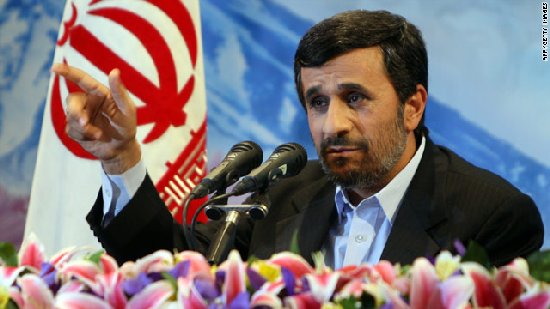
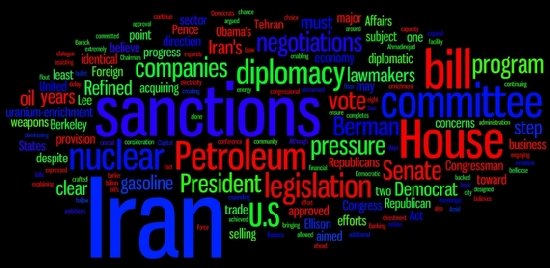

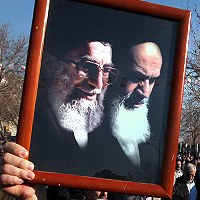
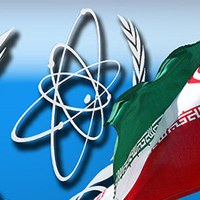
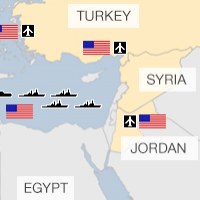

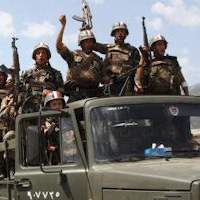




Iran Specified Conditions for Resuming Nuclear Talks With the West #iran #us #sanctions #nuclear shiism http://j.mp/aAmNQe
njslea Iran Specified Conditions for Resuming Nuclear Talks With the West …: The president of Ira… http://bit.ly/b7SFsf thejerichomarch
Iran Specified Conditions for Resuming Nuclear Talks With the West …: First, Iran considers its nuclear program … http://bit.ly/cMFSdn
RT @CrethiPlethi: Iran Specified Conditions for Resuming Nuclear Talks With the West #iran #us #sanctions #nuclear shiism http://j.mp/aAmNQe